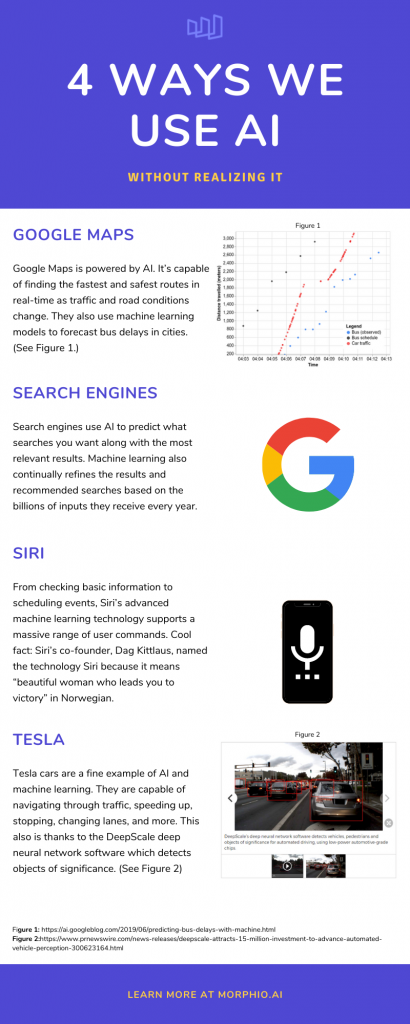
You use AI much more than you realize. In fact, I’d bet that you use it every day without noticing it.
It’s so easy to think about sophisticated robots and self-driving cars (More on those later) when you hear about AI—but there are many other ways it integrates into our lives.
Seeing as the AI market size is estimated to be worth up to $190 billion, it’ll become more obvious over time.
Nonetheless, artificial intelligence is saving you energy, keeping you safe, and making your life much more convenient while right under your nose.
Want to see how? Keep reading.
Start Defending Against Marketing Failures Today!
Discover why over a 1000 businesses trust Hawke AI to help protect their marketing ROI.
Request a free trial1. Google Maps
Remember that last time you road-tripped with your kids up to the cottage? Yep, that was artificial intelligence. It helped you stay safe and get you to your destination faster.
This is because Google Maps, just like most map applications, is powered by AI. It’s capable of finding the fastest and safest routes in real-time as traffic and road conditions change.
Google uses machine learning to analyze real-time data and make predictions about distance travelled potential interruptions and more.
Take a look at how they also use machine learning models to forecast bus delays in cities:
Data is extracted from transit agencies’ feeds about bus positions related to car traffic speed and their planned stops. This helps people like you remain on schedule to work, school, etc.
That brings me to my next point.
2. Search engines
Hello, Google. Could you tell me if you’re powered by AI? The answer is yes.
Both Google and its voice search counterpart is the best example of the daily use of AI. Who isn’t quick to pull out their phone and use Google when they need to know something?
The search engine uses AI to predict what searches you want along with the most relevant results. Machine learning also continually refines the results and recommended searches based on the billions of inputs it receives every year.
That means that not only are you using AI, you’re also contributing to making it more intelligent and improving the experience of other people all around the world!
3. Siri
How many times have you heard “Hey, Siri” followed by a question? Heck, you might do it yourself every day. From checking basic information to scheduling events, Siri’s advanced machine learning technology supports a massive range of user commands.
Furthermore, it’s capable of detecting language and improving its ability to pick up on spoken words. This is because Siri uses branches of AI known as natural language processing (NLP) and natural language generation (NLG.)
You can think of Siri as a search engine, as well. It uses the information it receives from users to improve the next query. Both errors and correct answers are noted to enhance the overall database of answers.
Here’s a cool fact, too: Siri’s co-founder, Dag Kittlaus, named the technology Siri because it means “beautiful woman who leads you to victory” in Norwegian.
That’s how I like to view AI: a technology that moves us towards achieving goals.
4. Have you ever driven a Tesla?
No matter what you’re opinion is on the Tesla Cybertruck, Elon Musk is a genius. The self-driving technology implemented into Tesla’s cars is a fine example of AI and machine learning.
Firstly, the car is capable of navigating through traffic, speeding up, stopping, changing lanes, and more. It’s practically alive. Furthermore, machine learning continually improves how safe the car navigates, learns new roads, etc.
This also is thanks to the DeepScale deep neural network software which detects objects of significance.
These include pedestrians, vehicles, debris, and other items that may come near you while driving. The AI continually learns how to detect and navigate these things better for continually safer driving.
5. Uber
You’re out with a few friends and have some drinks. How do you get home? Most likely Uber or Lyft, right? You can thank artificial intelligence for getting you home safe.
This is because rideshare apps like Uber use AI to determine the price of your ride, minimizing wait time, routing the driver to you, etc.
For example, the Uber heatmap shows drivers high traffic areas where rides will be in high demand.
How is this done? You guessed it: artificial intelligence. Their system measures and predicts demand based on requests along with weather-forecasting data.
No matter if you’re using an app like Uber to generate income or get around town, AI plays a role on both sides.
6. The spam filter of your inbox
We all receive spam emails. In fact, there are approximately 14.5 billion spam messages sent every day.
However, many times they never come across your eyes. Why is this? The spam box. This is an integral part of every email platform and—in case you don’t know—it’s powered by AI.
Spam filters are intelligent enough to decipher what message appears to be sent by humans or bots before appropriately filtering them. Additionally, some use machine learning to pick up on common traits and patterns to continually give you a better email experience.
Final thoughts
AI isn’t as intimidating as some think. It’s not reserved strictly for business, and in reality, is all around us.
Everything from the apps we use to public transportation is being integrated with AI. The best part is that we don’t realize this because it’s so subtle. It’s improving our daily lives while flying under the radar.
That’s exactly why more companies need to adopt this amazing technology. Want to see how AI can make day-to-day operations of your business easier? Try Morphio for free.
